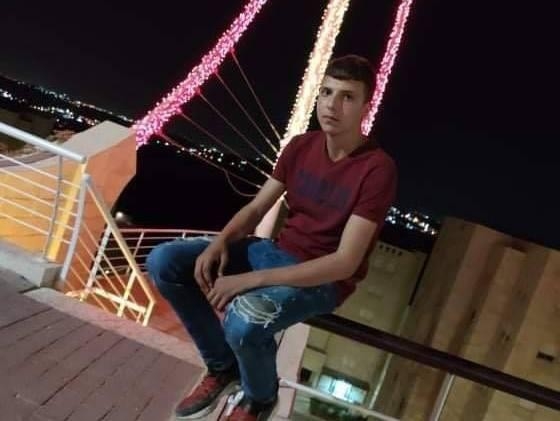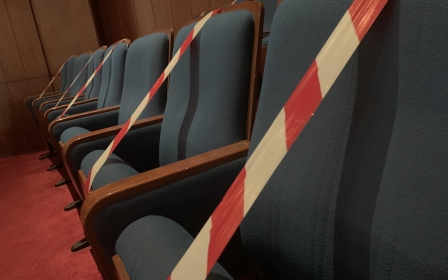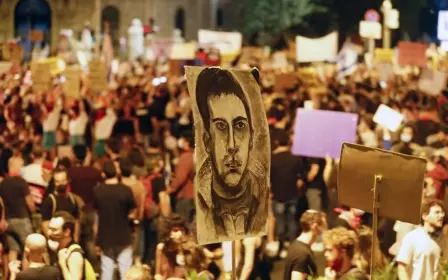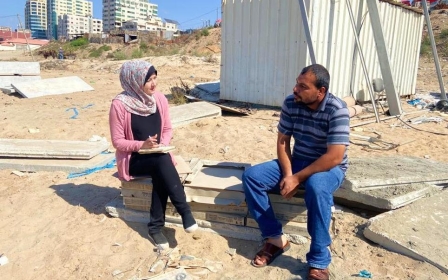Family of Palestinian teen accuses Israeli soldiers of beating him to death

The death of a Palestinian teenager early on Sunday morning, allegedly at the hands of Israeli special forces, is sparking outrage and raising questions across the occupied West Bank, as the family of the teen searches for answers.
Amer Snobar, 18, from the Nablus-area village of Yatma, was reported dead early on Sunday morning, with the cause of death allegedly from blunt-force trauma to the neck, the Palestinian Ministry of Health said.
Abdelrahim Snobar, Amer's father, told Middle East Eye that he was awoken by a phone call around 1am from Palestinian security officers in the village of Turmus Ayya, about 15km south of Snobar's home in Yatma, telling him that Israeli soldiers had caught his son and were "beating him".
'They beat him to death and didn't let anyone treat him. Why would anyone do that to a young boy, to a child?'
- Amer Snobar's father
"We rushed out of the house and went to Turmus Ayya in a frenzy, not knowing what was even going on, or why Israeli soldiers were attacking my son," Abdelrahim told MEE.
When he arrived at the entrance of Turmus Ayya with some relatives, Abdelrahim said, they were stopped by armed Israeli soldiers, who refused to let them reach his son's car, just a few hundred meters away.
New MEE newsletter: Jerusalem Dispatch
Sign up to get the latest insights and analysis on Israel-Palestine, alongside Turkey Unpacked and other MEE newsletters
"They held us up at gunpoint and didn't let us pass, no matter how hard we pleaded with them," he said, adding that, as far as he could see, none of the Israeli soldiers were providing medical care to his son.
"After a while, we saw Palestinian ambulances come and load my son into the ambulance," Abdelrahim said, adding that he was told by the Palestinian medics to follow them to the nearby city of Ramallah.
But by the time the medics arrived at the hospital in Ramallah, Amer was dead.
"The medics told us that when they arrived the soldiers didn't let them approach my son immediately," Abdelrahim said. "It's like they were waiting for him to die, before letting anyone touch him and try to resuscitate him.
"They beat him to death and didn't let anyone treat him. Why would anyone do that to a young boy, to a child? He's still a child."
Two different stories
The circumstances surrounding Amer's death, even into the late hours of Sunday afternoon, were still fuzzy.
Local Palestinian media, along with Amer's family, claim that Amer and a friend of his were out collecting tin cans and other metal items to sell to local blacksmiths, a job that Amer had been doing for a while after leaving high school.
It was not unusual, the family said, for him to be out and about in surrounding villages late into the night, so when he wasn't home after midnight his family was not too concerned.
The only eyewitness to what happened, aside from the Israeli soldiers in question, was Amer's friend, who was in the car with him.
According to Abdelrahim, the second young man reportedly fled the scene when the Israeli soldiers stopped the boys' car and reported the incident to Palestinian security in the area, who then informed him of the circumstances.
"The boys were driving an unregistered car, and were chased into Turmus Ayya by Israeli soldiers," Abdelrahim said, recounting the story as it was told to him by his sons" friend, adding that the soldiers in question were reportedly from the Israeli Yamama, a special forces unit of the Israeli border police.
Abdelrahim, along with local media, reported that an Israeli jeep had been tailing the boys' car for a number of minutes before following them into Turmus Ayya, stopping their car, and beating Amer.
The Palestinian health ministry, along with officials from Ramallah's Palestine Medical Complex to where Amer was evacuated, reported that he had been beaten to death, citing clear signs of physical trauma to his body consistent with being hit by large blunt objects, like the butt of a rifle.
The Israeli army, however, relayed a completely different story, saying that Amer tripped and "fell and hit his head" during a foot chase, causing his death, Haaretz reported.
"An Israeli army statement said forces were called to the area after reports of stone-throwing at a civilian car," Haaretz reported, adding that the calls to the area were made by Israeli settlers, who reside in the West Bank illegally.
"The soldiers identified two suspects and during a foot chase one of the suspects lost consciousness, fell and hit his head," Haaretz said. .
Further denying their role in Amer's death, the army statement went on to say that the soldiers provided first aid to Amer, a claim that directly conflicts with the eyewitness accounts of Palestinian medics and Amer's family members who were at the scene.
"This is unbelievable. They murdered him. They beat him to death and refused to give him aid," Abdelrahim said to MEE, adding that he saw his son's body before he was taken in for an autopsy.
"There were bruises and marks all over his body - on his chest, his neck, his face and head, everywhere. If that's not proof of what they did, I don't know what is," he said.
"The Israelis aren't giving real answers about what happened," he said. "But even if Amer was doing something wrong, there was no reason to kill him in cold blood."
'This is like a bad dream'
As Amer's family still struggled to piece together the events that lead to their son’s death early Sunday, mourners from around the village of Yatma made their way to the Snobar family home on the edge of the village.
"His mom is beside herself. She can't speak or walk. She can't believe what is happening," Rabiha Snobar, Amer's aunt told MEE outside the family’s home.
“She keeps crying and calling for her son, telling him to come home to her, it’s such a devastating sight to see,” Rabiha said.
No one in the family or in the village can really believe what is happening, she said. "It really feels like a bad dream, and we just want to wake up from it."
A group of Amer's cousins, teenagers around his age, surrounded Amer's 14-year-old brother as he wiped tears from his eyes, crying: "He was my brother, my friend."
"My cousin was the oldest of two sons in his family, and was loved so much by everyone," Juma'a Abu Aliya told MEE. "He wasn't in school, but he worked hard to help his family and to make a life for himself. We can't believe he's gone.
"The Israelis are murderers and killers," Aby Aliya continued. "The way they killed Amer was terrible. Just imagine, being attacked and beaten by soldiers until you die. It's indescribable.
"We as Palestinians don't have any rights, and can't defend ourselves. And on top of that, the Israeli soldiers are never held accountable for their actions, so they do whatever they want. The only one who will judge them is God, but for us, there is no justice here on earth."
Both Amer's aunt and cousin echoed the sentiments of Abdelrahim, as they puzzled over why, under any circumstances, Amer ended up dead.
"Even if he did something bad, they should have arrested him. Why did they kill him and then deny him care?" Abu Aliya asked.
Rabia, Amer's aunt asked, as she wiped tears from her face: "We don't know the reason why he was killed, but there is no excuse to kill a young boy like that and beat him to death. What could he have possibly been doing to justify that?
"The way they killed him was so aggressive. It's like an animal, to attack a kid like this, in this way. The people who did this to him are not human, they have no soul or feelings in their hearts."
Middle East Eye delivers independent and unrivalled coverage and analysis of the Middle East, North Africa and beyond. To learn more about republishing this content and the associated fees, please fill out this form. More about MEE can be found here.




